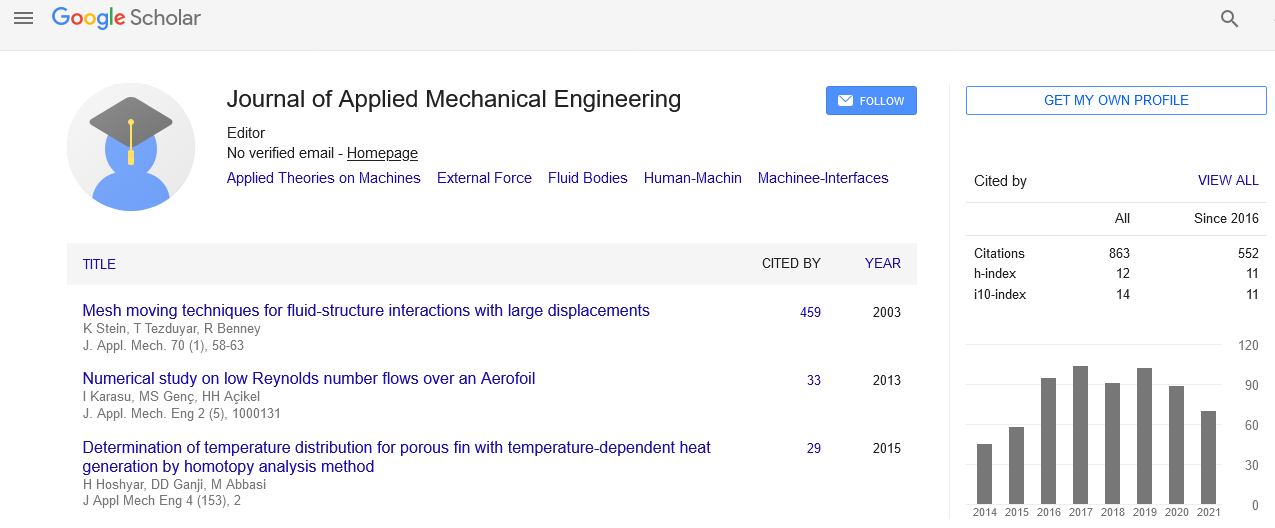Indexed In
- Genamics JournalSeek
- JournalTOCs
- CiteFactor
- RefSeek
- Hamdard University
- EBSCO A-Z
- OCLC- WorldCat
- Publons
- Google Scholar
Useful Links
Share This Page
Journal Flyer

Open Access Journals
- Agri and Aquaculture
- Biochemistry
- Bioinformatics & Systems Biology
- Business & Management
- Chemistry
- Clinical Sciences
- Engineering
- Food & Nutrition
- General Science
- Genetics & Molecular Biology
- Immunology & Microbiology
- Medical Sciences
- Neuroscience & Psychology
- Nursing & Health Care
- Pharmaceutical Sciences
Spherical magnetic drive for attitude control on nano satellites
Joint Event on 2nd International Conference on Advanced Robotics, Mechatronics and Artificial Intelligence & 3rd International Conference on Design & Production Engineering
December 03-04, 2018 | Valencia, Spain
Grazvydas Kazokaitis and Vytautas Jurenas
Kaunas University of Technology, Lithuania
Scientific Tracks Abstracts: J Appl Mech Eng
Abstract:
Small satellites are great tools for various research and analysis tasks. They can work like standalone units or to be modular and
combined together to the clusters. Depending on their missions and provided exercises, various orientation and positioning
systems are needed. Attitude control systems can be with active or passive elements. Typically, these systems are driven by:
gravitational forces, permanent or electromagnets, reactions wheels or thrusters. Small satellites have limited capabilities and
many restrictions for size, composition, energy consumptions. Nowadays most popular systems consume significant amounts
of energy, takes a lot of volume. As a possible option for alternative attitude control mechanism spherical magnetic drive
was submitted. Spherical permanent magnet has stable dipole and when it orientates with the Earth???s magnetic field, attitude
control can be achieved. This developed drive combines advantages of active and passive systems. The drive is fairly simple:
permanent magnetic sphere is inserted between two ring-shaped piezoelectric actuators. Electrodes of the piezoelectric rings
are divided into three equal sectors and are excited by separate harmonic signal. The out-of-plane bending and radial vibration
modes of the piezoelectric rings are excited to obtain elliptical motion of the contacting points and rotate magnetic sphere
about three axes. Amplitude and duration of the applied signal depends on rotation or motion trajectory of the sphere. In
addition, it must be mentioned that actuator can be driven by burst type signal in order to achieve very high resolution. Using
this technique, controlled movement of magnetic sphere is achieved. Numerical and experimental studies were performed to
verify operating principle and output characteristics of the actuator. The aim of study was to investigate vibration modes of the
piezoelectric actuators and identify resonance frequencies at which these piezoelectric actuators generate 3-DOF rotational
motion of a spherical rotor with high resolution, determinate further development steps.
Recent Publications
1. Kazokaitis Gra?vydas, Jur??nas Vytautas and Eidukynas Darius (2017) Research and analysis of spherical magnetic drive
for attitude control on nano satellites. Vibroengineering Procedia 15:50-55.
2. Bansevi?ius Ramutis Petras, Ma?eika Dalius, J?r??nas Vytautas, Kulvietis Genadijus and Bakanauskas Vytautas (2016)
Development of traveling wave actuators using waveguides of different geometrical forms. Shock and Vibration DOI:
10.1155/2016/4101062.
3. Grybas Ignas, Bansevi?ius Ramutis Petras, J?r??nas Vytautas, Bubulis Algimantas, Janut??nait?? J?rat?? and Kulvietis
Genadijus (2016) Ultrasonic standing waves-driven high resolution rotary table. Precision Engineering 45:396-402.
4. Osta?evi?ius Vytautas, Markevi?ius Vytautas, J?r??nas Vytautas, ?ilys Mindaugas, ??ep??nas Mindaugas, Ki?auskien??
Laura and Gylien?? Virginija (2015) Cutting tool vibration energy harvesting for wireless sensors applications. Sensors
and Actuators A: Physical 233:310-318.
5. ?akalys Rokas, Janu?as Giedrius, Palevi?ius Arvydas, ??ekas Elingas, J?r??nas Vytautas and Sodah Amer (2016)
Microstructures replication using high frequency excitation. Microsystem Technologies 22(7):1831-1843.
Biography :
Grazvydas Kazokaitis has experience in design and R&D fields developing small and precise mechanisms for ultra-fast laser beam control and machining apparatus. This experience allows providing solid foundation and knowledge creating possible solutions for laser beam orientation mechanisms between small units in space, attitude control and other control tasks.
E-mail: grazvydas.kazokaitis@ktu.edu

